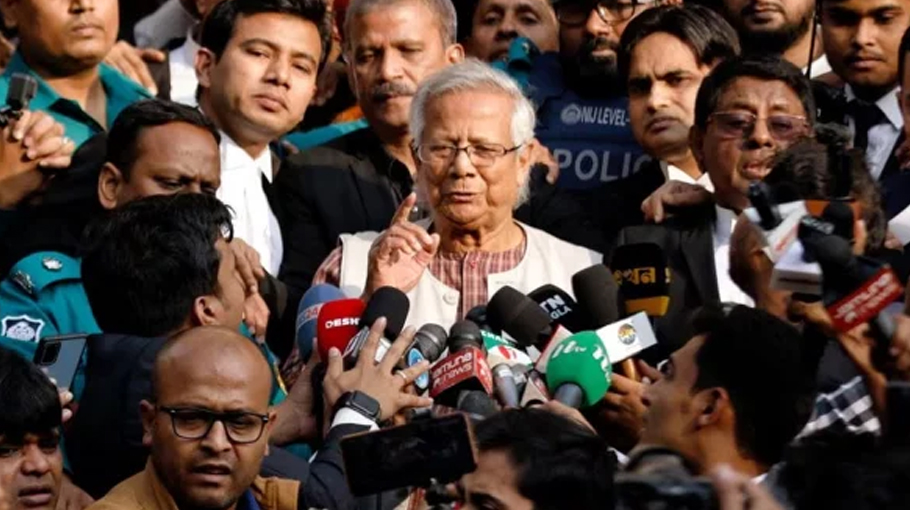HC orders Dr Yunus to pay Tk119cr in taxes

Grameen Telecom chairman Dr Muhammad Yunus will have to pay Tk119 crore in taxes to the National Board of Revenue (NBR), the High Court ruled on Thursday.
The High Court bench of Justice Muhammad Khurshid Alam Sarkar and Justice Sardar Md Rashed Jahangir passed the order.
The bench announced the verdict directing the Grameen Telecom chairman to pay the amount totaling taxes from 2011 till the next five years, Assistant Attorney General Tahmina Polly told the media.
The ruling came after the court settled a case filed by Dr Yunus challenging the tax demanded by the NBR.
On March 3, Dr Yunus, along with seven others accused in a case filed over the embezzlement of around Tk25 crore from dividends reserved for Grameen Telecom workers, was granted bail upon surrender.
Last May, the High Court found Dr Yunus guilty of tax evasion and ordered him to pay over Tk12 crore to the NBR, following a hearing on charges of tax evasion from 2011 to 2013.
Dr Yunus had contested the validity of the National Board of Revenue's notice that demanded around Tk15 crore tax on donations on May 23.
Later, in June 2023, the think tank Yunus Centre released a rejoinder to news articles about Nobel laureate Dr Muhammad Yunus' tax payments.
In a statement, the organisation said, "His main sources of income are honorariums for his lectures, money earned from the sale of his authored books and prize monies. All the money earned by him abroad is brought through proper banking channels. The tax authority remains fully informed of the matter as all sources of his money and income are presented in his tax returns."
It continued, "While Prof Yunus was thinking of what to make with his money he came up with several decisions. He never wanted to be the owner of any asset and does not own any asset anywhere. He wants to remain free from any ownership (land, house, car, shares, etc). So he decided to form two trusts with the money earned by him.
"These trusts were Professor Muhammad Yunus Trust, (PMYT), a usual philanthropic trust, and the other, a smaller one (6% of the total money), for the benefit of his family members, called the Yunus Family Trust (YFT). He incorporated a provision in the trust deed of the family trust that one generation after him, the remaining fund of this trust must be transferred to the PMYT."
Yunus Centre said he had done so to ensure that the money in the trusts would be safe under the supervision of the trustees during his lifetime and beyond that and that the trustees would be active in achieving the objectives of the trusts.
Yunus Centre said: "If he had kept his money with him he would actually have to pay less tax because the rate of personal income tax is lower than institutional tax. His income tax advisor advised that he would not have to pay gift tax if he donated the money to PMYT because it is a philanthropic trust.
"As to the family trust, his tax advisor's advice was that in such a case (the case of making some arrangement for the safety of his wealth in his absence) he would not have to pay any tax because the law allows it.
"On the basis of this advice, Prof Yunus did not pay any tax at the time of the transfer of the money to both trusts. But the tax officer concerned, after Prof Yunus' tax return was submitted, imposed a gift tax since there was a declaration of gift in the tax return."
"In consultation with his tax lawyer, Prof Yunus decided to seek a decision from the court. The court has given its opinion in favour of paying the tax," Yunus Centre added.
The think tank said there was no question of tax evasion as the press was accusing him of.
"It was Prof Yunus who went to the court to seek a decision on whether he had to pay the tax. The government did not go to court to demand the tax. The tax authority never said, at any stage, that he had evaded tax. There is no question of tax evasion here. The question was all about the interpretation of the law relating to the matter."
Now that the lower court had given a verdict in favour of paying the tax, Prof Yunus would have the option to pay the tax or go to the higher court to get its judgement on the issue, Yunus Centre said.
"If the relevant tax law does not require Prof Yunus to pay the tax, then he will have the opportunity to use the money for the benefit of people and the planet in the way he thinks would be best for them. That was his sole concern with regard to the payment of the tax. He does not personally benefit from either paying or not paying this tax."


